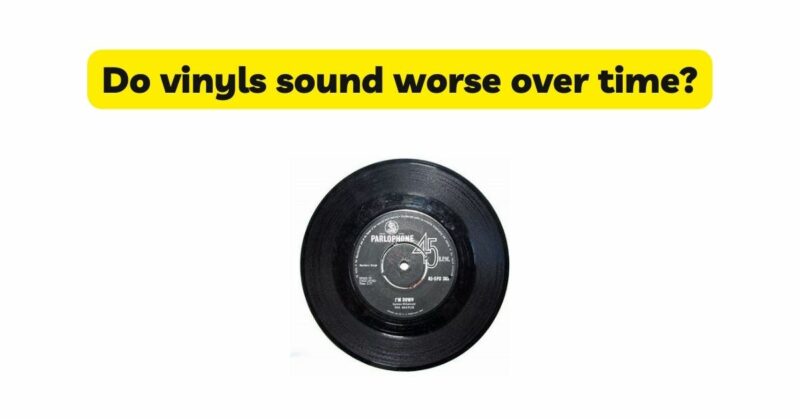Vinyl records have long been celebrated for their warm, rich sound and unique listening experience. As vinyl enthusiasts cherish their collections, a common question arises: Do vinyl records sound worse over time? In this article, we will explore the factors that may contribute to changes in sound quality and examine whether vinyl records genuinely deteriorate over the years. By understanding these factors, you can better preserve the sound quality of your cherished vinyl collection.
- Vinyl’s Resilience and Durability
Vinyl records are renowned for their durability and ability to withstand the test of time. Several factors contribute to their resilience:
a) Vinyl Composition: Vinyl records are made from polyvinyl chloride (PVC), a robust and flexible material. PVC strikes a balance between strength and flexibility, allowing records to endure repeated plays without significant degradation.
b) Groove Depth: Vinyl records feature deep grooves that protect the audio information. The stylus tracks within these grooves, minimizing direct contact with the vinyl surface and reducing wear over time.
c) Vinyl Thickness: The thickness of the vinyl record also plays a role in its durability. Thicker vinyl records, often found in high-quality pressings or audiophile releases, provide increased protection for the grooves during playback.
- Changes in Sound Quality
While vinyl records are known for their enduring sound quality, it’s essential to consider the factors that can potentially impact their sonic characteristics over time:
a) Wear and Tear: With each play, the stylus comes into contact with the vinyl surface, causing microscopic wear on the grooves. Over time, this wear can potentially affect the sound quality, particularly in high-frequency details and dynamic range.
b) Surface Contaminants: Dust, dirt, and other contaminants can accumulate on the vinyl surface, affecting playback and sound quality. These particles can cause pops, crackles, and surface noise that may impact the overall listening experience.
c) Stylus Wear: The stylus (needle) used for playback can contribute to changes in sound quality if not properly maintained. A worn or damaged stylus can cause increased groove wear and impact the fidelity of the audio reproduction.
- Proper Care and Maintenance
Proper care and maintenance practices can significantly impact the sound quality and longevity of vinyl records. Here are some essential practices to preserve the sonic integrity of your vinyl collection:
a) Storage: Store vinyl records vertically in a cool, dry, and stable environment. Avoid exposure to direct sunlight, extreme temperatures, or high humidity. Use protective inner sleeves and outer jackets to shield records from dust, moisture, and light.
b) Handling: Handle vinyl records with clean hands or wear cotton gloves to prevent the transfer of oils and contaminants. Hold records by the edges and avoid touching the playing surface.
c) Cleaning: Regularly clean vinyl records using a carbon fiber brush or a record cleaning solution to remove dust and debris. A clean record ensures optimal playback and reduces surface noise that may impact sound quality.
d) Stylus Maintenance: Maintain a well-aligned and clean stylus. Regularly clean the stylus using a stylus brush or specialized cleaning solution to remove dust and debris. Replace the stylus when it shows signs of wear or damage to ensure accurate tracking and minimize groove wear.
- The Myth of Inevitable Deterioration
Contrary to popular belief, vinyl records do not inevitably sound worse over time. With proper care and maintenance, vinyl records can maintain their sonic integrity for decades. High-quality records that are well cared for can provide consistent sound quality throughout their lifespan.
- Subjective Listening Experience
Sound quality is subjective, and individual preferences play a significant role in how listeners perceive vinyl records over time. Some listeners may appreciate the warmth and character that can develop as vinyl records age, while others may prefer the pristine sound of a brand-new pressing. Musical taste, playback equipment, and personal listening environments can all impact the perception of sound quality.
- Quality of Pressings
The quality of the record pressing plays a crucial role in sound quality and longevity. Well-pressed records from reputable labels or audiophile releases are more likely to provide a consistent listening experience over time. High-quality pressings often utilize superior mastering techniques and materials, resulting in records that can withstand repeated plays without significant degradation.
- Conclusion
The idea that vinyl records inevitably sound worse over time is a misconception. While wear and tear, surface contaminants, and stylus wear can potentially impact sound quality, proper care and maintenance can mitigate these effects. By adopting best practices, including storage in optimal conditions, regular cleaning, and stylus maintenance, you can preserve the sonic integrity of your vinyl collection and continue to enjoy the unique sound of vinyl records for years to come.


